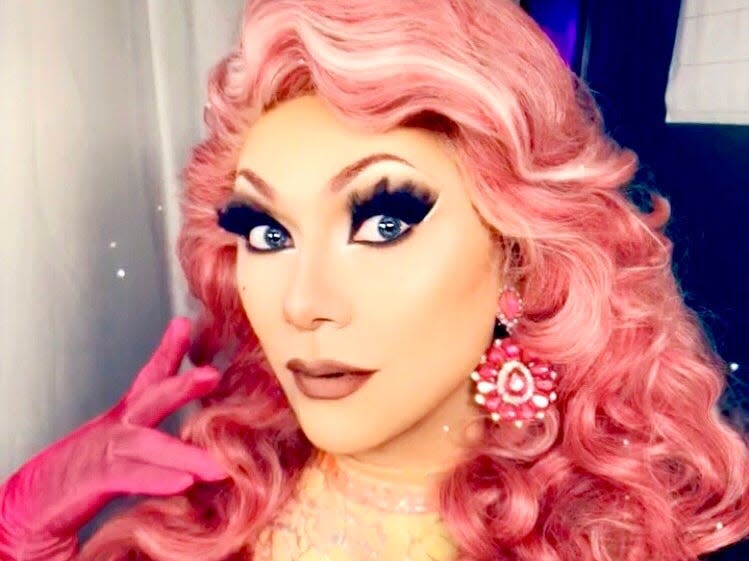I've been a drag queen in Tennessee for 10 years and scared the 'drag ban' will destroy my career

A new law makes staging "cabaret" performances in Tennessee a criminal offense.
Bella DuBalle, a Memphis-based drag queen, said this law will hurt both her and small businesses.
DuBalle also fears the law will dehumanize drag performers.
Bella DuBalle grew up in rural Tennessee and always felt a disconnect from the southern masculinity she was taught to project.
When she moved to Memphis in her 20s, and a friend asked her to dress in drag for an upcoming fundraiser, she didn't know it would change her life.
"The first time I put on drag was the first moment in my life that I allowed all of this feminine stuff that I had hidden away and been taught to be very ashamed of to come to the surface," DuBalle told Insider. "It was so euphoric."
DuBalle has been doing drag for a decade and working as a full-time drag queen in nightclubs and other venues for three years. However, a new law in Tennessee threatens her business and that of fellow drag performers in the community.
A new law, passed in early March, makes staging adult cabaret performances on public property or that could be viewed by a minor a criminal offense. It defines adult cabaret performances as any "that features topless dancers, go-go dancers, exotic dancers, strippers, male or female impersonators who provide entertainment that appeals to a prurient interest." While the bill does not explicitly state "drag," the vagueness of the language creates uncertainty as to how drag performers, transgender, and gender nonconforming people could be affected, critics and politicians say.
A federal judge in Tennessee temporarily blocked the implementation of the law hours before it was set to effect on April 1. DuBalle believes that were the law to take effect in the future, it would harm the income and livelihoods of both drag performances and the local businesses that feature them.
This is an as-told-to story based on an interview that has been edited for length and clarity.

We need to remember drag performers are people
For a city in the middle of the Bible Belt, I've always felt relatively safe in Memphis —it's a safe blue pocket in the state. That being said, I've always felt a strong pushback about drag and queerness from more conservative Tennessee communities. They're not as accepting.
As these laws came to the forefront, more people have been emboldened to say how much they hate us and it's very dehumanizing. It's fundamentally important, especially now in this discussion, to rehumanize drag entertainers and trans people. Because dehumanizing a group of people is a really slippery slope.
As a drag queen, it's always been part of my brand to remind people that it's all an illusion, that there is someone behind the makeup and hair. And with these laws being set in place, there's a real person who's deeply affected.
Building a full-time career took perseverance

It took years of hard work to turn this passion into a career. While it's definitely a fun form of art, I always saw it as a job even before I was getting paid. That meant being punctual, respectful, and prepared for my performance.
Because I treated every opportunity like a job, venues and show directors would refer me to each other knowing I would give a high-quality, professional show.
There are only a handful of jobs out there, so you have to create your own opportunities. And that's what I did: I approached the Memphis Riverboats to create the city's first drag show on the water and worked with local churches and libraries for events like drag queen storytime.
I'm also the full-time host at the nightclub Atomic Rose, where I emcee drag brunch on Sundays and drag shows on Friday and Saturday nights. I launched War of the Roses there, which turned into a six-season drag show.
I don't know if all of those opportunities will still exist after the ban goes into effect starting April 1.
People and businesses will be detrimentally affected by anti-drag bills
My fear is that not what the law can actually do, because in a recent meeting with the Memphis District Attorney Steven J. Mulroy, he ensured me that nothing we do is of the "prurient" or explicit sexual nature, and therefore not prosecutable.
I am nervous about what people perceive the law can do. It's already happened. Business owners see the headlines and automatically assume they can't continue, and that's leaving many people jobless.
People don't realize that drag is how many performers pay their bills and feed their kids. In some cases, like my drag kid, or mentee, who is a Black trans woman, it's the only career where they're accepted.
We might be up here looking glamorous, but we are hustling. This is hard work and it's important work.
Read the original article on Business Insider

 money
money 